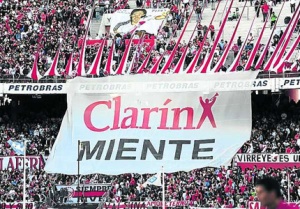
Source: Portal IMPRENSA.
Partial translation: C. Brayton
“Hostility” best describes the climate surrounding the Kirchner government and a segment of the Argentine media. Among the most hostile opponents of the government is ,Clarín, one of the largest media conglomerates in the region, with heavy investments in TV, cable, Internet, newspapers, magazines, and AM and FM radio.
Up until January of this year, the company was also a minority partner — together with La Nación — in the newsprint paper manufacturer Papel Prensa.
As in most combats, each side brings its own convictions to the field of battle.
In this case, one party wants to «put an end to a monopoly».
The other wants to «preserve freedom of expression».
On her weekly TV show Journalism for All, Jorge Lanata has noted the climate of hatred that has overtaken Argentina, flowing from both sides of the dispute. The violence is not verbal only. It has crossed over into the realm of physical violence as well. On November 8 -– known as 8N, it was the date of a nationwide anti-government rally -– Néstor Dib of Channel C5N, was violently assaulted by a protester.
President Kirchner herself is partly responsible for the violent tone of the debate. Since her time in the Senate, Cristina’s outstanding traits have been the confrontational and authoritarian bent of her rhetoric, which she now directs at what she calls “the coup-plotting media.”
According to the president, a free, private-sector press is unnecessary. All that is needed is a quality network of public communication and government-aligned news outlets — many of them owned by friends and godfathers and rewarded with official advertising contracts — to communicate with society.
This is a distortion of what Kirchner proposes, I think. The basic plan is to divide the pie into three slices: one for the for-profit private sector, one for the government — which could regulate the market by amending concession plans — and one for nonprofit public broadcasting.
Cristina refuses to speak with journalists who work for the privately owned news media. She uses monologue as her principal form of communication. As this edition was going to print, Cristina had used her authority to address the nation sixteen times already this year.
In all these speeches, she directly or indirectly attacked the press. In September, during a visit to Harvard, she was asked by students why she would not speak with the press, Cristina responding with sarcasm, dismissing the question with contempt.
At a time when Argentina is experiencing problems related to inflation, insecurity, energy shortages and foreign exchange issues, the government refuses to address these problems and claims that they form part of the “dirty game” played by the press.
The next chapter in the drama, which began in 2008, is scheduled down to the day: December 7, 2012, also known as 7D. The date was set by the Argentine supreme court in May 2012, when Clarin was ordered to comply with new legislation and surrender its broadcast concessions.
Under the Media Law, approved in October 2009, communications companies may operate up to 24 cable TV licenses, 10 radio stations, and one open to air TV station. Clarín has 240 cable concessions, nine AM radios, an FM and 4 open to air TV stations. The Clarin group appealed the decision on constitutional grounds.
Mariana Moyano, a researcher at the University of Buenos Aires, says that 7D is a term used by Grupo Clarín to position itself as a victim of “censorship.” Moyano sees the campaign as an attempt to defy the law.
“If the most powerful media group ignores the legislation, it will be very hard to exercise authority over smaller groups,” the professor says.
But Ricardo Kirschbaum, Clarín’s editor in chief, argues that the Media Law, if applied, would be an act of arbitrary power. “I expect the judges to decide on the case and that nothing will change on 7D. We believe implementing this law would be an arbitrary act. I hope we can find a way to resolve this issue,”said Kirschbaum.
Another Clarín journalist, Elisa Carrió, says that 7D is the beginning of a dictatorship.
Discussed constantly by TV programs on both sides of the issue, 7D has inspired Clarín to defend itself in response to a video the government ran to explain what would happen on the day. Claŕin used the same strategy, airing a video on its many channels claiming that nothing would happen on 7D, because Articles 45 and 161 of the Media Law were declared unconstitutional.
Reactions
Argentina has become a high-priority issue for various freedom of expression organizations around the world.
At the recent general assembly of the Sociedade Interamericana de Imprensa (SIP), members voted to send a commission to Argentina to observe events on 7D.
SIP is an old boy’s club of media barons intent on maintaining their latifúndio.
In early November, the International Broadcasting Association — AIR, in Spanish — also committed to sending an observer mission. The decision that has allowed Clarín to hang on to its channels for now could be continued for one more year.. The government says that will not happen, however.
The country’s media law is, in fact, a controversial policy. If, on the one hand, it has been used as a symbol of government power being used to stifle expression, on the other, it represents an indispensable weapon in the struggle against a monopoly.
Among journalists and ordinary citizens, opinions are divided, and many people support the government. Frank La Rue, the UN Special Rapporteur ONU for Freedom of Opinion, met with Martín Sabbatella of Afsca, the regulatory agency that will enforce the new law, and later said that “Argentina has an advanced form of regulation. It should serve as a model for the entire continent and other parts of the world as well.
Expectations are that 7D will be a day marked by demonstrations pro and contra the Media Law. Clarín says nothing will happen. Whatever does take place, Argentina is viewed as suffering from an acute polarization between press and government, comparable only to events in Venezuela in 2007, when Hugo Chavez refused to renew the concession of RCTV.

The convoluted history of the Papel Prensa newsprint monopoly is a vigorous mental exercise in its own right.
Another interesting read is an ESP column from 2010 narrating the passionate falling out between the Kirchners and a media monopoly that had long served their political purposes.
Filed under: Brazil |

